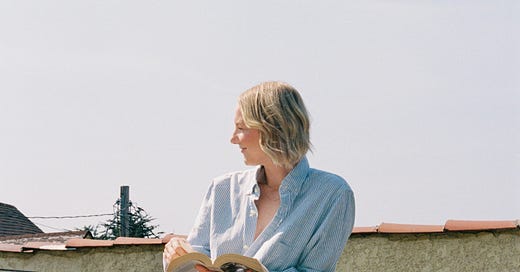LA is on fire and the internet is burning too
questions I don’t have answers to and maybe hope I never do
I’ve been putting off writing this all weekend because I know it will never be finished, and in fact may become undone, unravelled, picked apart, reassembled, a million times over, from the moment I hit “post.”
I’m used to creating within the structure of education — where there are six simple steps, a straightforward resolve, a plan, a strategy, a call to action.
This will not have any of that.
But yesterday I made a promise to publish something here, every week, which means the content will have to be unpolished and unprocessed and there will probably be spelling mistakes and shit I wish I had said differently when I read it back in a few weeks time.
I know for a fact there will be things I wish I had said differently, in this one.
But my writing is only my writing if it’s alive.
Good or bad or processed or polished will always come secondary to that, and I can’t pull a cute little content idea from my “Substack idea bank” while the city I am sitting in is burning.
A natural, social, and political disaster of unfathomable proportions is what is breathing and beating all around me, so that’s what I’m going to write about.
Below is a mess of questions I’ve been collecting from the little box of horrors our phones have all become, a portal to the big box of horrors that the people holding them are enduring. A dynamic that isn’t new, but with a proximity that is new to me. Observations from the sidelines of social media while also not being on the sidelines, at all.
LA is on fire and I think the internet is burning, too.
Does virality expand impact, or dilute it?
Let’s start with blowing my privilege wide open: I’ve never been in the same city as a crisis of this calibre (outside of the pandemic) to the degree that it takes me 6 IG Story taps to land on someone who ISN’T in LA right now. I wonder if the algorithm is algorithm-ing harder because every time I open my laptop I’m opening a fire-related URL of some kind, or if I just never noticed how engrained in the online LA-verse I was already until everyone was talking about the same thing. And everyone is talking about the actual literal same things. From the footage they’re reposting, to the helpful carousels they’re sharing, to the exact language they’re using to direct folks to the Watch Duty app, every Story is a copy of the one that came before it. That’s what virality is, obviously. The most shocking posts rise to the top — like the visual perspective on the Palisades fire inching closer to double the size of Manhattan, at the time I’m writing this — but the question I keep posing quietly is… are they really more, or even AS, impactful as the ones that don’t? Awareness creates action, I do believe that. But I also know exactly what my local coffee shop is doing for the community (accepting blankets, pillows, and phone chargers, specifically, for folks who have been displaced) and which wine bar I’ll be going to tonight (because they’re donating all glasses of red to relief efforts) and I only had to read those things once.
Can we respect the brands who keep branding?
The inundation of the same fundraisers, same quotes, same photos has made it more obvious when brands are sticking to their own story, contributing to the conversation in a way that was quite clearly crafted by an in-house marketing team committed to staying firmly in their lane. This is in some ways evil, and in others oddly comforting. The wellness brands preying on our existential volatility, pushing their own agendas while people are scared, obviously fucking sucks. But the post I saw on the Architectural Digest page left an indelible imprint on me because it was so on-brand and yet un-predatory: a list of the structural gems that have been impacted by the fires, and to what degree. I speak often about being the voice in crisis that your community specifically needs (rather than rallying behind the mass messaging just to say you did it) and this was a poignant example of precisely that, commercial in a way that still felt… honest.
Is oversharing the expectation? And, for who?
“Oversharing” as I’ve always defined it, is posting for the purpose of soothing yourself rather than supporting your people. The type of post that asks the viewer to say “I’m so sorry” instead of “thank you for talking about this.” I don’t believe there is a universal threshold of what is too vulnerable, but that the angle we take on that vulnerability can either give energy to our people, or take it away. I’m realizing that this philosophy has no place in Los Angeles, right now. The lines have blurred entirely. Here, some of the pain that people are sharing online is actually for the benefit of their community. The followers begging influencers with DMs of “you have to tell us how you’re doing,” so they tell us they’re okay, or they tell us that they’re not, and now we have seen the leaders we look up to face the camera with tears in their eyes, to let us know that their homes burned to the ground, because we asked them to. “I’m so sorry and thank you for talking about this.” Here, it’s both. The collective need for assurance, even if it’s negative, proof of life, proof of hurt, proof of anything. Online communities — long distance relationships, for all intents — are finding safety in certainty, even if that certainty comes by learning of their leader’s lack thereof. But vulnerability is freedom, too, and so maybe it goes both ways: comfort in the sharing, comfort in the seeing.
Will the shaming ever sleep?
So far, my conclusion is *no.* The cycle of forced virtue-signalling keeps spinning round and round, pitting people against each other who were, up ‘til the moment that the catty comment was posted, playing on the same team. The default assumption is that “if you don’t post, you don’t care” but then also the highly complex “if you DO post, you don’t care” is also in the mix, criticizing influencers and business owners for posting regular content or selling services, regardless of whether their audience is LA-based or not. The ask is actually, “post exactly what is expected of you to prove that you are a quality person and do not put anything else out into the internet that doesn’t align with that expectation.” Because we feel such ownership over the communities we invest our energy into, we panic when the behaviour of that leader doesn’t line up with the way we want to be perceived. But is a post the only proof we need? If they do the good deed in silence, does it not matter? And what if they did it under duress, their fear of being cancelled stronger than their desire to help? How much does it matter then?
And that’s where this conversation ends and opens, unfinished.
With the questions that have been rattling through me as I whisper “Threads is not a news source” for the 16th time in the last ten minutes, eyes watering from the incessant scrolling and the debris in the air, both.
With the questions I don’t have answers to and maybe hope I never do.
𐄂𐄂
ICYMI:









